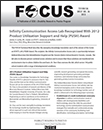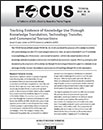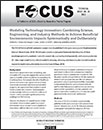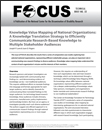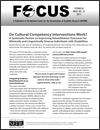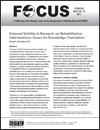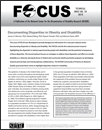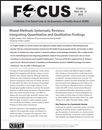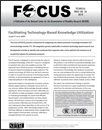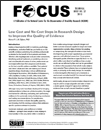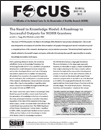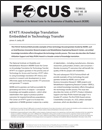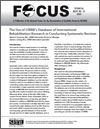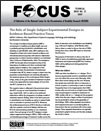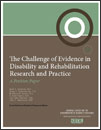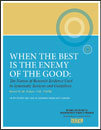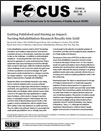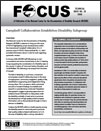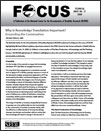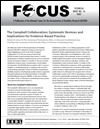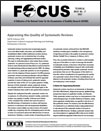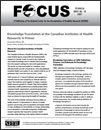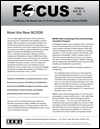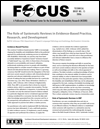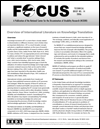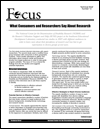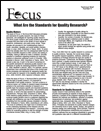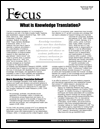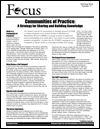SEDL's Free Briefs and Reports for Connecting Disability Research to Practice
Connecting Disability Research to Practice
Briefs and Reports
The objective of this systematic review is to examine experimental and quasi-experimental studies about interventions that (i) include one or more behavioral, psychological, educational, or vocational components, (ii) involve cancer survivors aged 18 years or older, and (iii) assess intervention outcomes on employment outcomes. The aims are both to describe the variety of interventions that have been studied using rigorous methods and to estimate intervention effects.
The purpose of this review is to identify and assess the evidence related to interventions for individuals with traumatic brain injury that are directly focused on return to work.
This FOCUS Technical Brief describes the exemplary knowledge translation work of the winner of the Center on KT4TT's 2012 PUSH Award. The recipient, Infinity Communication Access Lab, is a partnership between Holland Bloorview Kids Rehabilitation Hospital and the Toronto District School Board in Toronto, Canada. The lab aims to discover person-centered access solutions and to ensure that those solutions are transferred into environments true to where children live and learn. Dr. Tom Chau oversees the lab, which serves 130 public school students with a range of developmental conditions.
This systematic review aims determine the effectiveness of pre-graduation interventions aimed at persons with autism spectrum disorders to shape behaviors, social interactions, and/or skills that result in employment in mainstream competitive employment settings.
This FOCUS Technical Brief, which extends FOCUS No. 26, explains how knowledge translation and technology transfer contribute to not only technological innovation but also commercial transaction, which is the actual transformation of knowledge embodied in products and services into beneficial socioeconomic impacts.
This FOCUS Technical Brief summarizes a paper recently published in the open-access journal Implementation Science. The full paper presents a conceptual framework that integrates all three knowledge-generating methods—scientific research (R), engineering development (D), and industry production (P)—into a logic model format, which is useful for planning, obtaining, and measuring the intended beneficial impacts by implementing knowledge in practice.
This issue of FOCUS describes a systematic review that was conducted to address a critically important research question about cultural competency by taking stock of the current literature and evidence. The review examined whether cultural competency interventions improve rehabilitation outcomes for ethnically and linguistically diverse individuals with disabilities, and if so, for whom and under what conditions.
This issue of FOCUS describes the results from a series of comparative case studies exploring how selected national organizations, representing different stakeholder groups, can play an important role in communicating new research findings to diverse audiences. Knowledge value mapping helps understand the context of each organization’s mission and the interests of their members.
This issue of FOCUS discusses external validity and what rehabilitation researchers can do to help practitioners answer the question “How far can we generalize this finding–– is it applicable to other clients/ patients, with different characteristics, in dissimilar settings treated by other clinicians?,” which clinicians and other practitioners ask whenever researchers publish evidence in support of a new or revised intervention.
Effectively meeting the needs of an increasingly diverse population of students presents challenges for educators across the United States, including the Texas and Southeast Comprehensive Center regions. To support ever more rigorous achievement expectations, educators need to provide flexible, accessible curricula that give students’ multiple pathways to success and secure opportunities for all children.
This FOCUS, presents NIDRR-funded research highlighting the disparities in obesity experienced by youth and adults with disabilities, potential consequences of those disparities, and suggestions for addressing these disparities. Authors James H. Rimmer, PhD; Edward Wang, PhD; Kiyoshi Yamaki, PhD; and Brienne Davis, MPH conducted the research for the Disability and Rehabilitation Research Project (DRRP) "Reducing Obesity and Obesity-Related Secondary Conditions in Adolescents with Disabilities" (H133A060066), Center on Health Promotion for Persons with Disabilities, University of Illinois at Chicago.
This FOCUS is adapted from Dr. Angela Harden's presentation at the "National Institute on Disability and Rehabilitation Research (NIDRR) Knowledge Translation Conference," held July 29, 2009, in Washington, DC. Widely known for her methodological work integrating qualitative research into systematic reviews, she is an active contributor to the Cochrane and Campbell Collaborations and has a keen interest in research synthesis and knowledge translation. She has conducted extensive research into the health of young people and the communities in which they live.
This FOCUS presents a framework for integrating two distinct processes: knowledge translation (KT) and technology transfer (TT). The integration permits stakeholders involved in technology-based research and development activities to identify and coordinate their respective roles, and to optimize the eventual use of research by industry for production purposes.
This edition of FOCUS, authored by Marcel P. J. M. Dijkers, PhD, offers low-cost and no-cost steps that rehabilitation researchers can take to strengthen the quality of their evidence and, thereby, the likelihood of their work receiving a high evidence grade and being included in systematic reviews.
This edition of FOCUS presents the Need to Knowledge (NtK) Model for new product development. The model was designed to encompass all activities from inception of a project through post-launch evaluation to paint a complete picture of the research, development, and production processes. This technical brief explains the details related to the model’s stages and gates, while also introducing four specific opportunities to employ knowledge translation techniques.
This issue of FOCUS provides examples of how technology-focused grantees funded by NIDRR can embed knowledge translation efforts throughout the technology transfer process, and describes the Product Utilization Support and Help (PUSH) Award.
This FOCUS, describes the Center for International Rehabilitation Research Information and Exchange’s (CIRRIE) bibliographic database of International Rehabilitation Research. The database is useful for conducting systematic reviews. It includes research conducted in most geographic regions of the world as well as citations to articles originally published in languages other than English.
This FOCUS, written by Ralf W. Schlosser, PhD, describes high-quality, single-subject experimental designs (SSEDs) in terms of establishing empirically supported treatments and implementing evidence-based practice (EBP).
Published by the National Center for the Dissemination of Disability Research (NCDDR), each FOCUS Technical Brief explores a specific topic related to disability and rehabilitation research.
This paper states the position of the National Center for the Dissemination of Disability Research (NCDDR) Task Force on Standards of Evidence and Methods (TFSE) regarding the need for (a) the thoughtful determination of research evidence on the basis of both the rigor of the research and the relevance of the research to the lives of people with disabilities; and (b) systems that facilitate our ability, on a timely basis, to describe what the best available evidence is in response to specific topical questions in disability and rehabilitation.
The Task Force on Systematic Review and Guidelines developed this paper to explore critical issues related to the "gold standard" for research designs, the emergence of systematic reviews, and the implications for evidence-based rehabilitation and clinical practice.
This FOCUS suggests strategies that rehabilitation researchers can use to maximize their work—turning "research results into gold." In the disability and rehabilitation research community, it is important for researchers to be cognizant of how published results of research studies can facilitate or limit their use in answering important evidence-based questions.
This FOCUS, highlights exciting new developments within the international Campbell Collaboration (C2) establishing a disability subgroup. A previous issue of FOCUS (Technical Brief, No. 16, 2007) provides background information about C2 and its work regarding systematic reviews.
This FOCUS highlights a speech by Dr. Michael Gibbons at the KT08: Forum for the Future Conference in Banff, Alberta, Canada, held on June 10, 2008. In his address, Gibbons proposed a framework of knowledge translation as an engagement process rather than a linear process of transfer.
This issue of FOCUS, written by Herb M. Turner III, PhD and Chad Nye, PhD, highlights the work of the Campbell Collaboration (C2) and the development of systematic reviews of research evidence.
This FOCUS is part two of a three part series on systematic reviews. This issue describes critical considerations for appraising the quality of a systematic review including the protocol, question, sources, scope, selection principles, and data extraction. The author also describes tools for appraising systematic reviews.
This FOCUS describes the work of the Canadian Institutes of Health Research (CIHR) and efforts to translate knowledge from the research setting into real-world applications for the benefit of Canadians.
This issue of FOCUS summarizes the KT process as described by several international authors. International scholars, particularly from Canada and Europe, have published numerous articles on KT processes and strategies. While the majority of these KT articles are published in medical and health-care journals, there is a growing interest in applying the KT concept more generically (i.e., knowledge to action) and to other disciplines, including disability and rehabilitation research.
This issue of FOCUS, written by Ralf W. Schlosser, PhD, is part one of a three part series on the topic of evidence-based technology. This issue provides an overview of systematic reviews in research and development. Systematic reviews aim to synthesize the results of multiple original studies by using strategies that delimit bias. Systematic reviews can be used to inform evidence-based practice, which is increasingly shaping the disability and rehabilitation research field.
This FOCUS summarizes the knowledge translation (KT) process as described by several international authors. While the majority of international articles on KT processes are published in medical and health-care journals, a growing interest exists in applying the KT concept more generically to other disciplines, including disability and rehabilitation research.
The NCDDR and the Research Utilization Support and Help (RUSH) project at the Southwest Educational Development Laboratory conducted two studies in 2005 with different audiences in order to learn more about their perceptions of research and how best to get information to diverse groups of end users. This issue of FOCUS shares the findings from the two studies and suggests potential implications.
This issue of FOCUS discusses principles and standards for quality research, the basis for these standards, and strategies for reporting quality research. In the fields of disability and rehabilitation research, there is a healthy debate regarding the specific criteria for quality research, and the specific checklists to be used to standardize reporting. As the debate ensues, there are many ideas emerging in the public domain related to quality research and quality evidence that can be used to help guide the discussion.
This FOCUS discusses knowledge translation (KT), a relatively new term used to describe a relatively old problem—the underutilization of evidence-based research in systems of care. This article describes relevant KT concepts and planning models, and suggests a working definition for KT that reflects disability research and development priorities.
This FOCUS discusses the use of Communities of Practice (CoPs) as a knowledge transfer (KT) strategy. By building on its members' shared knowledge, a CoP can be useful in developing new ideas and new strategies.
This paper provides a balanced look at the issues arising from current policies toward inclusion and maps out considerations school and district leaders should keep in mind when setting special education policies.



